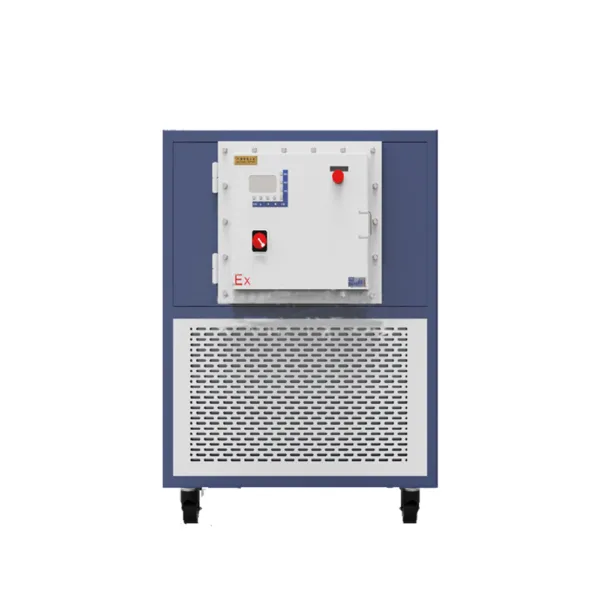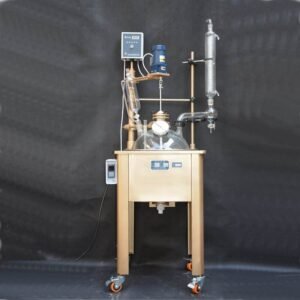Discover how the Chemical Reaction Temperature Circulator works, its applications in research and industry, and how to select the best model for your experiments. This in-depth guide covers the essential features that make it a critical tool for controlling reaction temperatures.
In the world of scientific research and industrial applications, temperature regulation plays a crucial role in the success of chemical reactions. Precise temperature control ensures optimal reaction rates, higher yields, and the prevention of unwanted by-products. The Chemical Reaction Temperature Circulator is an indispensable tool designed to maintain consistent temperatures throughout the reaction process, guaranteeing reliable and reproducible results.

What is a Chemical Reaction Temperature Circulator?
The Chemical Reaction Temperature Circulator is a laboratory instrument engineered to precisely control the temperature of chemical reactions. By circulating temperature-regulated fluids—either heated or cooled—around the reaction vessel, it creates a stable environment that supports optimal reaction conditions. Whether heating or cooling, the circulator ensures that temperature variations do not disrupt the reaction’s progress.
This type of circulator is widely used in both academic research and industrial settings, offering high versatility to accommodate a range of temperature requirements. By maintaining precise thermal conditions, it maximizes the efficiency and reliability of experiments, especially when temperature-sensitive reactions are involved.
The Key Role of Temperature Control in Chemical Reactions
Temperature significantly influences chemical reactions, often dictating their speed, yield, and pathway. For example, reactions carried out at higher temperatures tend to proceed more quickly, while lower temperatures may slow down or even halt certain reactions. However, controlling these fluctuations is essential to avoid side reactions or incomplete transformations.
The Chemical Reaction Temperature Circulator plays a vital role by maintaining a constant temperature within a narrow range, ensuring that the reaction takes place under ideal conditions. This is particularly important when working with catalysts, enzymes, or thermally sensitive chemicals, where even slight temperature variations can lead to undesired results.
Applications of Chemical Reaction Temperature Circulators
In Laboratory Research
In academic laboratories, the Chemical Reaction Temperature Circulator is essential for studying chemical kinetics and reaction mechanisms. Accurate temperature control is fundamental when exploring new reactions, especially when researchers need to evaluate the effects of temperature on reaction rates and products.
By maintaining the reaction at a constant temperature, the circulator ensures that researchers can isolate the effects of other variables and achieve reproducible results. For example, in organic synthesis, precise temperature control can lead to higher yields of the desired product and fewer by-products.
Pharmaceutical and Biochemical Research
In the pharmaceutical industry, where chemical reactions are often used to develop active pharmaceutical ingredients (APIs) or formulations, temperature control is essential. Even minor temperature fluctuations can degrade the quality of the product or affect its potency. A Chemical Reaction Temperature Circulator ensures that chemical reactions involved in drug development remain stable, preventing the breakdown of sensitive compounds.
Moreover, in the production of biologics and other biochemical products, enzymes and proteins are highly sensitive to temperature. The circulator’s ability to regulate temperature to within a narrow range helps maintain the stability and activity of these molecules, ensuring that the results are accurate and reproducible.
Industrial and Material Science Applications
Temperature control is equally critical in industrial-scale reactions, particularly in the production of chemicals, polymers, and other materials. In material science, temperature affects properties such as viscosity, solubility, and crystallization rates. The Chemical Reaction Temperature Circulator ensures that these processes occur under controlled conditions, optimizing the characteristics of the final product.
For example, in polymerization reactions, where temperature controls the molecular weight distribution of the polymer, using a circulator ensures consistent product quality and minimizes batch-to-batch variation. Similarly, in the production of specialty chemicals, maintaining a stable temperature can lead to more efficient processes and higher yields.
Choosing the Right Chemical Reaction Temperature Circulator
When selecting a Chemical Reaction Temperature Circulator, it’s important to consider several factors to ensure that the equipment meets the specific needs of your experiments:
- Temperature Range: Different reactions require different temperatures. Whether you’re performing high-temperature synthesis or cooling reactions, make sure the circulator can handle the temperature range needed for your specific application.
- Flow Rate and Pump Capacity: The circulator should provide adequate flow and pressure to ensure that the temperature-controlled fluid circulates evenly through the system. Higher flow rates are often needed for larger-scale reactions.
- System Compatibility: Ensure that the circulator is compatible with your experimental setup. This includes checking for compatibility with the size and type of reaction vessels, as well as the circulation system’s connectors.
- Ease of Operation: Choose a circulator with an intuitive interface, easy-to-read displays, and programmable settings that allow for precise adjustments. Features such as automatic temperature calibration and real-time monitoring can make experiments more efficient.
- Maintenance and Durability: Consider the long-term performance of the circulator. A durable and reliable device with low maintenance requirements can reduce downtime and improve overall efficiency in the lab or industrial facility.
The AKGD-100L-40C-200C Chemical Reaction Temperature Circulator exemplifies a versatile solution designed to meet the stringent temperature control demands of chemical reactions. With both heating and cooling capabilities, it offers precise temperature regulation for a wide range of applications.
Advantages of the Chemical Reaction Temperature Circulator
- Precision Temperature Control: The circulator ensures highly accurate temperature regulation, maintaining reaction conditions within a narrow, predefined range.
- Dual Heating and Cooling Capabilities: The ability to both heat and cool the system makes the circulator suitable for a variety of reactions that require dynamic temperature control.
- Reliable Fluid Circulation: With efficient fluid circulation, the system maintains uniform temperature distribution, essential for larger-scale or complex reactions.
- User-Friendly Design: Modern circulators often come with user-friendly interfaces and advanced controls, making them easier to use, especially in high-demand research environments.
- Energy Efficiency: Newer circulators are designed with energy efficiency in mind, providing powerful temperature control while minimizing power consumption.
The Future of Chemical Reaction Temperature Circulators
As chemical research and industrial applications continue to advance, the role of the Chemical Reaction Temperature Circulator will evolve. The next generation of circulators is expected to feature even more advanced temperature control technologies, such as real-time adaptive regulation and enhanced energy efficiency. These innovations will allow for more precise and efficient reactions, further improving the performance and outcomes of experiments across various fields.
Additionally, the integration of automation and IoT technology into circulators will enable remote monitoring and control, enhancing the flexibility and convenience of experiments.
For more details on the Chemical Reaction Temperature Circulator and how it can enhance your research or industrial processes, you can watch a demonstration here.



